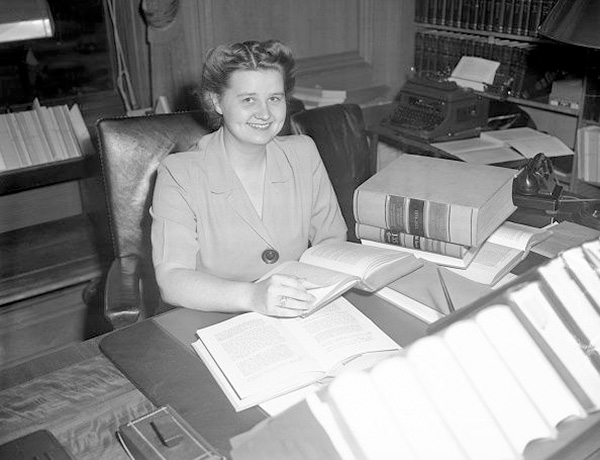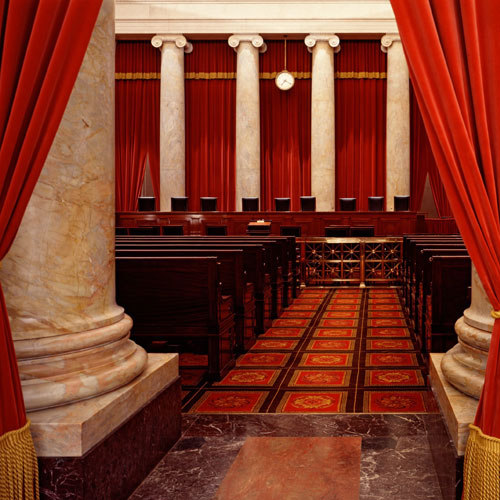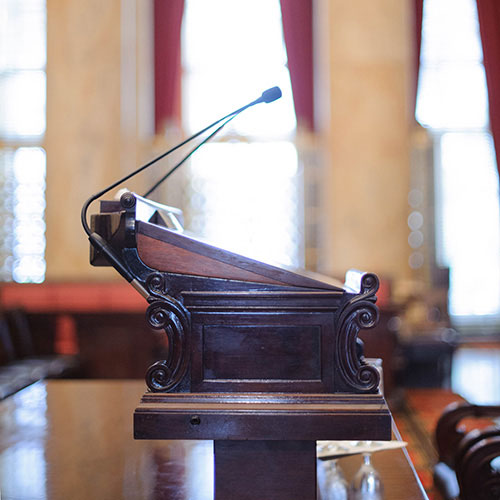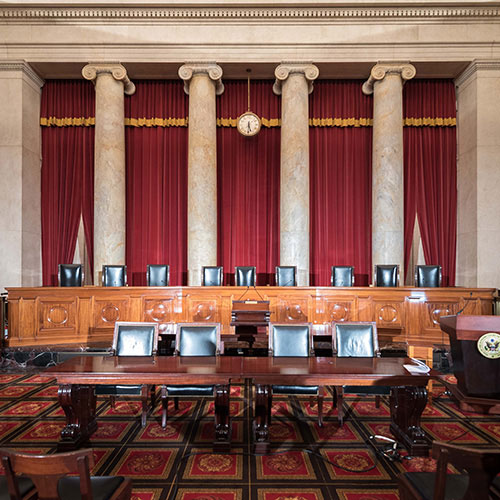The story of an attorney who became the first female Supreme Court Law Clerk and broke barriers for women in the legal profession and corporate America.

Helen Lucile “Lu” Lomen was born in Nome, Alaska, on August 21, 1920, three days after the ratification of the 19th Amendment. Her father was a prominent businessman, owned the local newspaper, the Nome Gold Digger, and was a member of the Alaska Territorial Senate. Her mother was a homemaker who often encouraged Lu to play outside. Lucile preferred to read by the fire. Life in Nome came with many challenges including being frozen into the city from October to June. Lucile’s uncle, Carl Lomen, benefited from the difficult climate and built a wildly successful reindeer farm. He was dubbed the “Reindeer King” of Alaska.
In 1934, Lu and her family moved to Seattle, Washington so that she and her brother could finish high school. At first, she was overwhelmed by the size of the school, which had double the population of her hometown. She focused on her studies, however, and joined the honor society before graduating from Queen Anne High School in 1937. Lucile received a scholarship to attend Whitman College in Walla Walla, Washington. She was an excellent student, flourishing in a much smaller environment. Elected to Phi Beta Kappa, she graduated with honors in 1941. Lu was inspired to be a lawyer by her paternal grandfather who was a lawyer appointed to the Alaska Territorial Court. She applied to the University of Washington Law School which had been admitting women since 1899. Harvard Law School did not admit women until 1950. Lucile was one of several women admitted to the law school for the 1941-1942 school year.
Lucile continued to be an exceptional student and ranked first in her law school class. She was the only woman on law review in 1943 and served as law review editor, vice-president of the law review board, and wrote numerous scholarly articles. She won the prize for the best student essay on constitutional law; it was later published by the law review and referenced by Justice Ruth Bader Ginsburg in a 1998 lecture at Wellesley College. In addition to her studies, Lucile worked as a part-time secretary to Dean Judson F. Faulknor of the law school. This connection would be instrumental to her future. She graduated first in her class in 1944.
After the attack on Pearl Harbor in 1941, and the United States’ entry into World War II, hundreds of thousands of Americans (men and women) rushed to enlist. Many of Lucile’s male classmates joined up at the end of the 1941-1942 academic term. The law was still a male-dominated field and clerkships at the Supreme Court reflected the same. The number of men who enlisted in the military at this time created a shortage of highly qualified Supreme Court law clerks for the 1944 Term. One Associate Justice, William O. Douglas, addressed this deficit with a willingness to take “an absolutely first-rate” female law clerk. Lucile benefited from her academic excellence, an instrumental recommendation from Dean Faulknor, and a shared alma mater in Whitman College with Justice Douglas. He also preferred his clerks come from the Ninth Circuit. Her exceptional academic record and superb recommendations from past professors set her apart and Justice Douglas chose Lucile to be the first female Supreme Court law clerk.
Lucile arrived in Washington, D.C. the Friday before Labor Day in 1944. It was the first time she had been east of Washington state and she wanted time to acclimate herself to the nation’s capital. The following Tuesday she arrived at the Supreme Court rather early and, realizing no one from Justice Douglas’ staff had arrived, she quietly joined a small tour of the Supreme Court building.
Lucile spent the first few weeks of her clerkship writing certiorari memos and waiting for Justice Douglas to arrive. As the only female clerk, she became a bridge between the female secretaries and the other law clerks. Prominent female attorneys in Washington, D.C. made sure to make connections with Lucile through dinner invitations and other social gatherings. Though she was respected by Chief Justice Harlan F. Stone and the other Associate Justices, she had a difficult time bonding with the law clerks. However, she suspected it may have had more to do with her age (law clerks were often older and not fresh out of law school), education, and geographic background than with her sex, “They were all east-coast fellas [Byron] Kabot was hired from [Chicago]. So everybody but me had been educated at [Chicago,] Harvard, Yale and Columbia. I was younger…I never knew if my problem was because I was a woman or because I was younger, or what.”
Being one of Justice Douglas’s law clerks kept Lucile very busy. It was her responsibility to ensure that every statement of law and fact in the Justice’s opinions was correct. Lucile reviewed each of his opinions with him, even disagreeing with him on occasion. She often worked 16-hour days to ensure her work was completed well and caught up on her rest during the weekends.
Her time as a Supreme Court law clerk passed quickly and resulted in several prominent job offers–one from the Justice Department in D.C. and another in Seattle from the Washington State Attorney General’s office. Desiring to return home, Lucile returned to Washington. She kept in touch with Justice Douglas and thanked him for the opportunity he provided her: “I recognize the incomparable value of last year’s experience and I am grateful for the opportunity which you gave me. I certainly hope to be a better lawyer because of it.” Although she served the Court well, another female law clerk was not selected for another 22 years.
After serving as assistant state attorney general for three years, Lucile applied for a position in General Electric’s legal department. When one of the executives was hesitant to hire her because of her sex, Lucile reached out to Justice Douglas. Citing her legal knowledge, dependability, and work ethic, he unequivocally recommended her. Lucile got the position and worked for General Electric for 35 years, repeatedly being the first woman to serve in her various positions. During her time with General Electric she held many important positions, including counsel for corporate affairs. In the 1970s, Lucile was listed as one of the top 100 corporate women in the country by Business Week. She retired in 1983 from corporate headquarters on the east coast and moved back to Washington once more. She recalled her time as a Supreme Court law clerk as “not easy…[but] very rewarding…I would not have given up the experience for anything.” She also noted that numerous doors were opened to her as a woman in the legal profession because of her clerkship. Lucile passed away on June 21, 1996 at the age of 75. She was a true pioneer for women in the legal profession.
Key Vocabulary:
- 19th Amendment: Granted women the right to vote. It was passed by Congress June 4, 1919, and ratified by the states on August 18, 1920.
- Phi Beta Kappa: the oldest academic honor society in the United States.
- Law Review: Scholarly publications, usually edited by law students in collaboration with faculty members (professors).
- Pearl Harbor: a deep-water U.S. naval base in Hawaii.
- World War II: (1939-1945) the war fought mainly in Europe and Asia between the Allied Powers (Great Britain, United States, and Soviet Union) and Axis Powers (Germany, Italy, and Japan).
- William O. Douglas: (1898-1980) the longest serving Associate Justice of the Supreme Court. He served for 36 years.
- Ninth Circuit: the regional federal judicial circuit composed of Alaska, Arizona, California, Hawaii, Idaho, Montana, Nevada, Oregon, and Washington.
- Certiorari Memos: prepared by law clerks, these documents summarize the legal arguments made by the parties in each case.
- Justice Department: a department of the executive branch responsible for the enforcement of federal law and the administration of justice.
- Attorney General: the principal (top) legal officer in the Department of Justice who represents the U.S. government in court cases. Each state also has an attorney general who is in charge of enforcing state laws and representing the state government in court.
Discussion Questions:
- How did Lucile set herself apart from her classmates in college and law school?
- What role did both geography and World War II play in the opportunities that were offered to Lucile?
- How did Lucile’s experiences as a Supreme Court Law Clerk impact her future career?
- Why is Lucile considered a “pioneer?” What lessons can be learned from her life?
Sources:
- Special thanks to scholar and author Helen Knowles for her review, feedback, and additional information.
- Daniel J. Danelski , “Lucile Lomen: The First Woman to Clerk at the Supreme Court” (1999).
- Judge Robert S. Lasnik, “Go East, Young Woman: Breaking the Supreme Court Gender Barrier” (2020).




